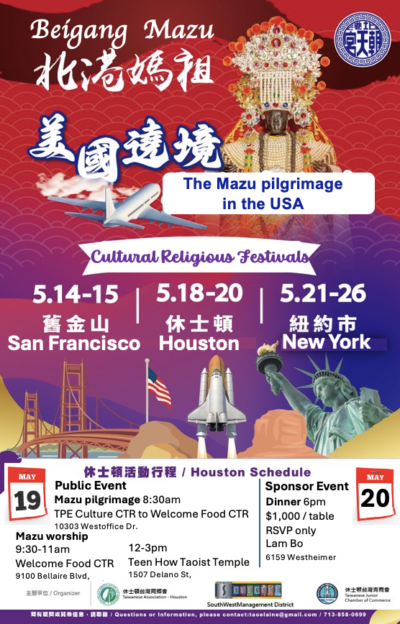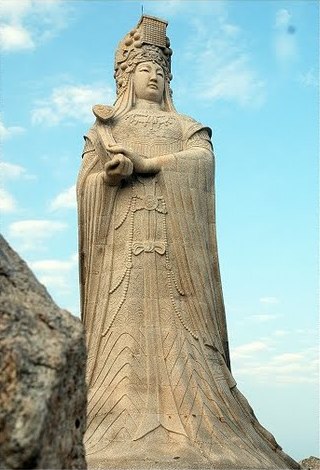 Much like the Virgin Mary is cherished for her compassion and protective power in Western culture, Mazu, the Goddess of the Sea in the Far East, is venerated for her ability to calm the ocean and safeguard sailors and fishermen.
Much like the Virgin Mary is cherished for her compassion and protective power in Western culture, Mazu, the Goddess of the Sea in the Far East, is venerated for her ability to calm the ocean and safeguard sailors and fishermen.
Originating from Fujian, a Chinese province on the East China Sea, Mazu has for centuries been worshiped beyond the People’s Republic of China, with strong footholds as a folk deity in Taiwan and among the Chinese diaspora in other Asian coastal communities.
For the first time, the legendary goddess will be celebrated in Houston in a May 18-20 pilgrimage organized by the local chapter of Taiwanese Association of America (TAA) with a co-sponsorship by Southwest Management District.
Featuring a sacred statue of Mazu from the 330-year-old Chao Tian Temple in Beigang, Taiwan, a pilgrimage parade is set to start at 8:30 a.m May 19 parade along Ranchester Drive in Chinatown, followed by a subsequent worship ceremony at the Diho Square Shopping Center. The pilgrimage continues at the Teen How Taoist Temple near downtown to allow more devotees to pay homage.
Kenneth Li, the management district’s board chairman, said the notion of a deity embodying grace, benevolence and protective strength holds universal appeal.
“Southwest Management District is proud to host the pilgrimage in the heart of Chinatown so the culture of Mazu will not only be celebrated by residents with roots in mainland China, Taiwan, Vietnam and other Southeast Asian countries, but also be shared with Houstonians at large,” Li said. “I look forward to this inaugural event becoming an annual celebration that would add to the multicultural richness of our community.”
 Legend has it that Mazu, originally a young woman named Lin Moniang from Fujian, had extraordinary powers to tame rough seas and ensure the safe return of fishermen. Her death at 28 following her heroic rescue of her father and brother during a storm, earned her the appellation of Mazu, which translates to “Mother Ancestor” in Chinese. Fishermen erected temples in her honor, solidifying her status as the Goddess of the Sea.
Legend has it that Mazu, originally a young woman named Lin Moniang from Fujian, had extraordinary powers to tame rough seas and ensure the safe return of fishermen. Her death at 28 following her heroic rescue of her father and brother during a storm, earned her the appellation of Mazu, which translates to “Mother Ancestor” in Chinese. Fishermen erected temples in her honor, solidifying her status as the Goddess of the Sea.
Elaine Tao, former president of the TAA’s Houston chapter, believes that the quest for hope and protection as represented by Mazu may have contributed to the phenomenon of a growing following of the deity by young people in Taiwan in recent years, as evidenced by surges of their participation in pilgrimages. A New York Times report on May 3 notes “a striking number” of young pilgrims to be those in their teens or 20s during two recent annual pilgrimages on the island.
A highlight of the cultural calendar, Mazu pilgrimages traditionally occur during the third lunar month, coinciding with Mazu’s birthday. Pilgrims trace Mazu’s statue as it bestows blessings on various locales. During a divination ritual at the Chao Tian Temple in Taiwan, devotees believed Houston, Texas to be a stop that Mazu would like to make on her U.S. visit, Li said.
A temple leader will accompany the Mazu statue to Houston along with a sedan chair the temple donated to seat the statue during the parade. Also, an eight-person carriage was air-freighted to Houston for the occasion thanks to sponsorship by Taiwan’s EVA Air, Tao said.
The Southwest Management District has made arrangements with the Houston Police Department to provide traffic control and other services for the events.
“We look forward to Mazu’s blessings in Houston for the first time,” Tao said. “Mazu’s visit to our city symbolizes a bridge between cultures, fostering understanding and unity among diverse communities.”
— by Zen Zheng








